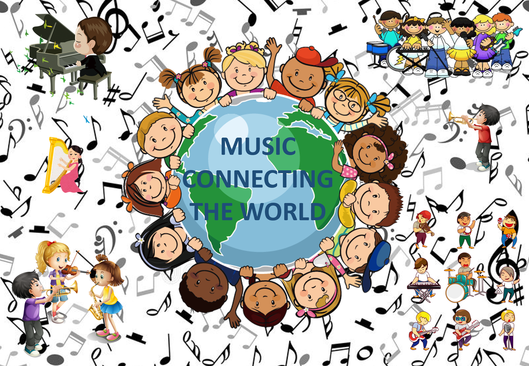In the grand tapestry of religious thought, the Bahá’í Faith offers a profound interpretation of music as a divine conduit—a ladder leading the soul closer to God. This metaphor underscores the transformative nature of music, elevating it beyond mere auditory pleasure to a spiritual enchantment that resonates deeply within the human soul. This exploration seeks to elucidate the manner in which Bahá’í teachings articulate music’s central role in connecting humanity to the divine, fostering unity, and instilling a sense of transcendence.
At the heart of Bahá’í belief lies the recognition that music possesses an intrinsic spiritual essence. Shoghi Effendi, the Guardian of the Bahá’í Faith, articulates that music has the power to awaken the soul and inspire a sense of devotion. This notion aligns with the Bahá’í perspective that every instrument of art and expression can be a manifestation of divine reality. Music transcends the confines of the physical realm, serving as an ethereal ladder that ascends toward the heights of spiritual awareness.
To appreciate the Bahá’í view on music, one must first engage with the significance of sound in the context of creation. The universe, as expressed in Bahá’í writings, emerged from a singular divine Word—an all-encompassing vibration. This Word, imbued with the potential for creation, mirrors the transformative power of music, which can elevate hearts, soothe spirits, and unify disparate souls. The rhythmic patterns and melodic structures found within various musical traditions echo the primordial tones of creation, bridging the gap between the finite and the infinite.
Furthermore, music fosters an environment ripe for spiritual and communal engagement. In the beauty of harmony, one can find reflections of unity—a core tenet of Bahá’í teachings. Music has historically played a pivotal role in communal gatherings, where it serves to uplift and inspire collective worship. When individuals come together to partake in musical expression, they create an atmosphere that encourages connection, fostering relationships grounded in shared experiences and beliefs. This communal aspect of music acts as a scaffold, reinforcing the very idea that humanity is an interconnected tapestry, wherein each thread contributes to the richness of the whole.
Moreover, the Bahá’í teachings highlight music as a tool for individual reflection. Each note can serve as a reminder of the soul’s journey and the quest for understanding one’s purpose within the grand design of existence. The reflective nature of music allows for moments of introspection—inviting individuals to pause, listen, and engage in self-examination. In this context, music becomes not merely an art form but rather a ritual—an act of devotion that deepens one’s awareness of the divine presence. It is in these moments that music manifests as a ladder to sublime realizations and profound insights.
As we delve deeper into the implications of music within the Bahá’í framework, one cannot overlook the capacity of musical diversity to reflect the multiplicity of human experience. Every culture, with its unique idioms and traditions, contributes to a richer, more nuanced understanding of spirituality. The Bahá’í teachings embrace this diversity as reflective of the myriad ways in which the human spirit seeks to articulate its relationship with the divine. By allowing for the inclusion of various musical styles—from the haunting melodies of Persian call to the rhythmic beats of African drums—Bahá’í practice profoundly embodies the principle of unity in diversity.
Additionally, the ephemeral nature of music further accentuates its role as a spiritual ladder. Unlike other art forms, music exists momentarily, evoking a profound sense of immediacy. This fleeting quality inspires urgency in the listener to embrace the present moment—an invitation to delve into the spiritual now. The transient beauty of music encourages an appreciation of life’s impermanence and beckons one to engage fully with the divine reverberations that saturate existence. Attuning oneself to these moments opens channels within the heart and mind, facilitating an ascent towards a more profound understanding of one’s relationship with God.
The Bahá’í teachings also compel us to examine the ethical implications of music. The artistic expression inherent in music must strive for upliftment—a guiding principle within Bahá’í philosophy. The essence of music should propel individuals towards virtuous action, fostering attributes such as love, compassion, and unity. In this sense, music transcends entertainment; it becomes an ethical imperative, directing listeners towards behaviors that align with the higher virtues espoused by the Bahá’í Faith. Therefore, music’s ability to cultivate spiritual virtues makes it a potent instrument of change, capable of inspiring individuals to elevate their lives in service to humanity.
In conclusion, the exploration of music through the lens of Bahá’í teachings reveals a profound richness that establishes it as a ladder connecting the earthly to the divine. Through its capacity to awaken, reflect, unite, and inspire, music becomes a transformative force in the quest for spiritual awakening. It is a dynamic expression of the soul’s continuous journey toward understanding its place within the divine paradigm. By embracing music in its many forms, individuals can elevate their spirits, foster communal ties, and recognize the beauty of unity amid diversity. Thus, the echoes of music remain a vital essence in the pursuit of spiritual enlightenment within the framework of the Bahá’í Faith.
